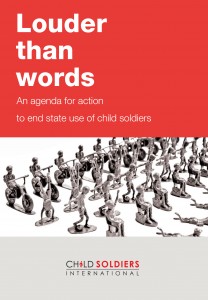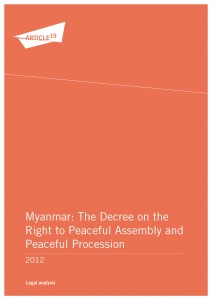Human Rights (383 found)
Report on the Human Rights Situation in Burma (April – September 2012)
Over the period of this report, the political landscape in Burma has undergone noticeable shifts. Daw Aung San Suu Kyi, once a political prisoner under house arrest, recently returned from a whirlwind tour of the United States where she received […]
• • •Rohingya in Bangladesh: Maintaining the Status Quo; Squandering a Rare Opportunity
For decades, Burmese Rohingya fleeing persecution have sought refuge in Bangladesh. June’s inter-communal violence in Burma’s Rakhine State, as well as subsequent state-sponsored persecution and targeted attacks against Muslim populations […]
• • •Rohingya in Burma: Spotlight on Current Crisis Offers Opportunity for Progress
Despite an abundance of natural resources, Rakhine State is the second-poorest state in Burma. The simmering tension that exists between the Rakhine and stateless Rohingya communities has been stoked by poverty for decades. However, in June 2012 that tension boiled over […]
• • •Report of the Special Rapporteur on the Situation of Human Rights in Myanmar
The mandate of the Special Rapporteur on the situation of human rights in Myanmar was established by the Commission on Human Rights in its resolution 1992/58 and extended most recently by the Human Rights Council in its resolution 19/21 […]
• • •Not in Theory, Not in Practice: Freedom of Assembly and Association in Burma
The rights of peaceful assembly and association in Burma are fragile at best. The Burma government has enacted reforms to address this gap in human rights protection. Sadly the reforms are lacking and citizens are regularly denied any semblance of protection in relation to international human rights standards.
The Unlawful Associations Act1 and the NGO Registration Law haven’t been repealed; these remain large obstacles if Burma is to have freedom of assembly and association […]
• • •Land Grabbing in Dawei (Myanmar/Burma): An (Inter)National Human Rights Concern
Land grabbing is an urgent concern for people in Tanintharyi Division, and ultimately one of national and international concern, as tens of thousands of people are being displaced for the Dawei Special Economic Zone (SEZ). Dawei lies within Myanmar’s (Burma) southernmost region, the Tanintharyi Division, which borders Mon State to the North, and Thailand to the East, on territory that connects the Malay Peninsula with mainland Asia […]
• • •Louder Than Words: An Agenda for Action to End State Use of Child Soldiers
 The report “Louder than words: An agenda for action to end state use of child soldiers” is published to mark the tenth anniversary year of the entry into force of the Optional Protocol to the Convention on the Rights of the Child on the involvement of children in armed conflict. It examines the record of states in protecting children from use in hostilities by their own forces and by state-allied armed groups. It finds that, while governments’ commitment to ending child soldier use is high, the gap between commitment and practice remains wide. Research for the report shows that child soldiers have been used in armed conflicts by 20 states since 2010, and that children are at risk of military use in many more […]
The report “Louder than words: An agenda for action to end state use of child soldiers” is published to mark the tenth anniversary year of the entry into force of the Optional Protocol to the Convention on the Rights of the Child on the involvement of children in armed conflict. It examines the record of states in protecting children from use in hostilities by their own forces and by state-allied armed groups. It finds that, while governments’ commitment to ending child soldier use is high, the gap between commitment and practice remains wide. Research for the report shows that child soldiers have been used in armed conflicts by 20 states since 2010, and that children are at risk of military use in many more […]
Freedom on the Net 2012
While the military junta that ruled Burma for decades was interested in expanding information and communication technologies (ICTs) for business and propaganda purposes, it also made aggressive attempts to restrict access to digital media and control online content. Elections in November 2010 changed this dynamic […]
• • •The Decree on the Right to Peaceful Assembly and Peaceful Procession
 The Decree on the Right to Peaceful Assembly and Peaceful Procession is one of the first laws governing civil and political rights to be adopted since the election of a quasi-civilian government in November 2010. ARTICLE 19’s analysis of the law finds the law to be inconsistent with the right to freedom of expression and the right to assembly.
The Decree on the Right to Peaceful Assembly and Peaceful Procession is one of the first laws governing civil and political rights to be adopted since the election of a quasi-civilian government in November 2010. ARTICLE 19’s analysis of the law finds the law to be inconsistent with the right to freedom of expression and the right to assembly.
In the analysis, ARTICLE 19 appreciates the Decree’s recognition of the state’s duty to protect assembly participants. However, the requirement for permission to hold an assembly, the grounds for denying permission, the lack of a court appeal and the absence of guarantees for media access to assemblies are problematic and must be urgently revised […]
Resolution of 13 September 2012 on the Persecution of Rohingya Muslims in Burma/Myanmar
The European Parliament, having regard to its previous resolutions on Burma/Myanmar, and in particular that of 20 April 2012[1], having regard to the progress report of 7 March 2012 by the UN Special Rapporteur on the situation of human rights in Myanmar […]
• • •
 All posts
All posts